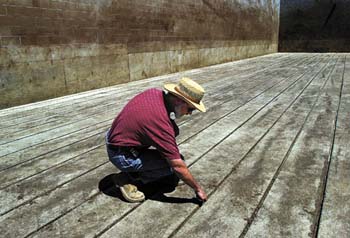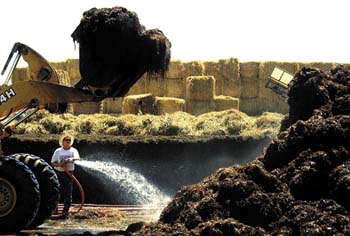The Appeal-Democrat
Marysville-Yuba City, CA
July 24, 2003
By Ching Lee/Appeal-Democrat

Duncan Soldner, consulting project manager for Colusa Mushroom Inc.,
looks over grooves used to pump air into compost bunkers, Thursday.
Colusa resident Jeneane Wilsey is not happy with the way she says her town has been smelling lately.
She said the first time she noticed things weren't smelling so sweetly was in February.
"We didn't know what we were smelling. I honestly thought something died. I thought it was a dead raccoon," said Wilsey.
She soon learned that a new mushroom plant moved to Colusa County about two miles from her home on Walnut Tree Drive. The operation, Colusa Mushroom Inc., is a new tenant of Colusa Industrial Properties, which houses 950 acres of light- and heavy industrial plants on Niagara Avenue off Highway 20.
According to Ed Hulbert, general manager of the industrial park, the mushroom plant was under construction in October 2002 and began operating sometime in February.
That's when he began receiving complaints about the odor.
"It smelled like a dead animal," said Dorothy Murphy, who lives on Country Club Drive, less than two miles from the plant. "You were hearing it all over town. A woman I knew had a luncheon in her yard and had to take everything inside because it smelled so bad."
What they smelled was not mushrooms being grown, but the making of compost used to grow mushrooms.
Typical white-button mushrooms sold in grocery stores feed on wheat straw, explained Duncan Soldner, vice president of Colusa Mushroom Inc. In nature, mushrooms sprout from decomposing plant matter. To speed this process along when growing mushrooms commercially, mushroom operations rely on tons of compost.
To make compost, wheat straw is watered; mixed with cottonseed and canola seed byproducts, gypsum and dried poultry waste; then piled in heaps where the materials sit for days to decompose.
"Mushroom production is really a very green form of sustainable agriculture because it does not contribute to soil depletion and recycles agricultural byproducts," Soldner said.
Soldner said he expects to generate $5 million in gross sales annually.
The biggest challenge is curtailing the odors that result from the compost and finding a way to be good neighbors.
For years, the Petaluma Mushroom Farm, which Soldner also manages, faced the same challenges. According to the Petaluma Argus-Courier, the plant was forced to shut down its compost-making operations at the end of 2002 due to neighborhood complaints about foul odors and water pollution violations.
The plan was to move the composting site to Colusa, then truck the compost to Petaluma. A spin-off of Petaluma Mushroom, Colusa Mushroom was built to incorporate new technology that Soldner said would remedy the odor.
According to minutes from a Colusa County Board of Supervisors meeting last August, Soldner assured the board that "the proposed Colusa Mushroom facility will be state of the art and will not cause odor problems to neighbors."
By placing the decomposing material in bunkers and pumping air into the mounds, Soldner said this technique would solve much of the odor problems and make better compost.
This new technology never came to fruition at the San Diego Mushroom Farm in Bonsall, owned by the Colorado-based company Rakhra Groups Inc., where Soldner was also a consultant. A lawsuit from community groups over the farm's smell and orders from the state Regional Water Quality Control Board-San Diego to clean up water-runoff pollution into a nearby stream eventually led the company to cease its on-site composting operation.
Due to construction delays, the bunkers at Colusa Mushroom had not yet been built when the plant began making compost, which subsequently caused the bad odors, said Soldner.
"We had a contract to supply compost (to Petaluma Mushroom)," he said. "We very much apologize for the event and regret having started on the wrong foot. We're really trying to work with the community to try to solve this problem."
According to Wilsey, the odor has not gone away, even with the bunkers in place. She would like to see the plant shut down until it can rectify the problem.
"The smell has persisted to this day. Yesterday morning, the smell was so sickening at 6 a.m. that I gave up mowing the yard," she told the Colusa County Board of Supervisors on Tuesday.
Soldner believes the smell may now be coming from wastewater currently being collected in a sump, which normally would be recycled back into the process. Because the facility is still under construction, the highly concentrated water has nowhere to go.
Soldner is working with Hulbert to divert the water into the industrial park's own wastewater facility.
Although Hulbert believes some of the complaints he has gotten may be "blown out of proportion," he does not dispute there is an odor problem.
"That's why we're working to resolve this problem for the long term," he said.
Bob MacKaben, who lives on Country Club Drive, said he is concerned about the smell but also sees the operation as a "new source of revenue for the city and county."
"I just see the dollar signs for the community in the future," he said. "I don't want to cut the throat on something that's not complete yet."

Nevis Freis of Colusa waters a pile of compost Thursday at the Colusa
Mushroom plant. The plant produces 300 tons of compost per week used to
grow mushrooms.